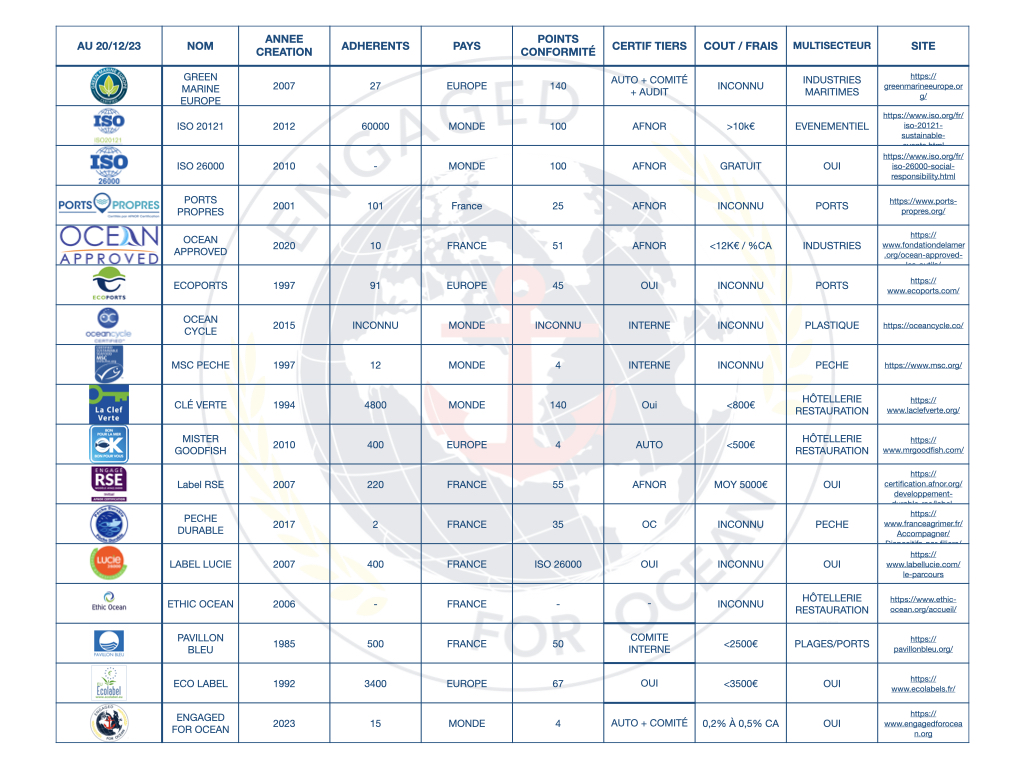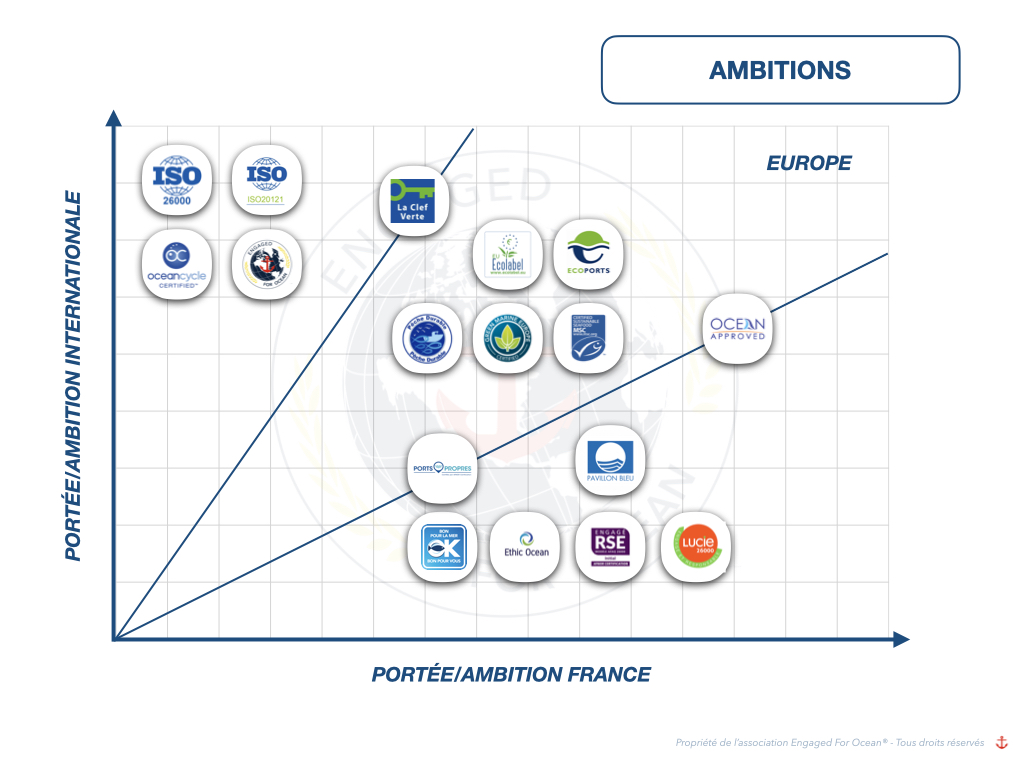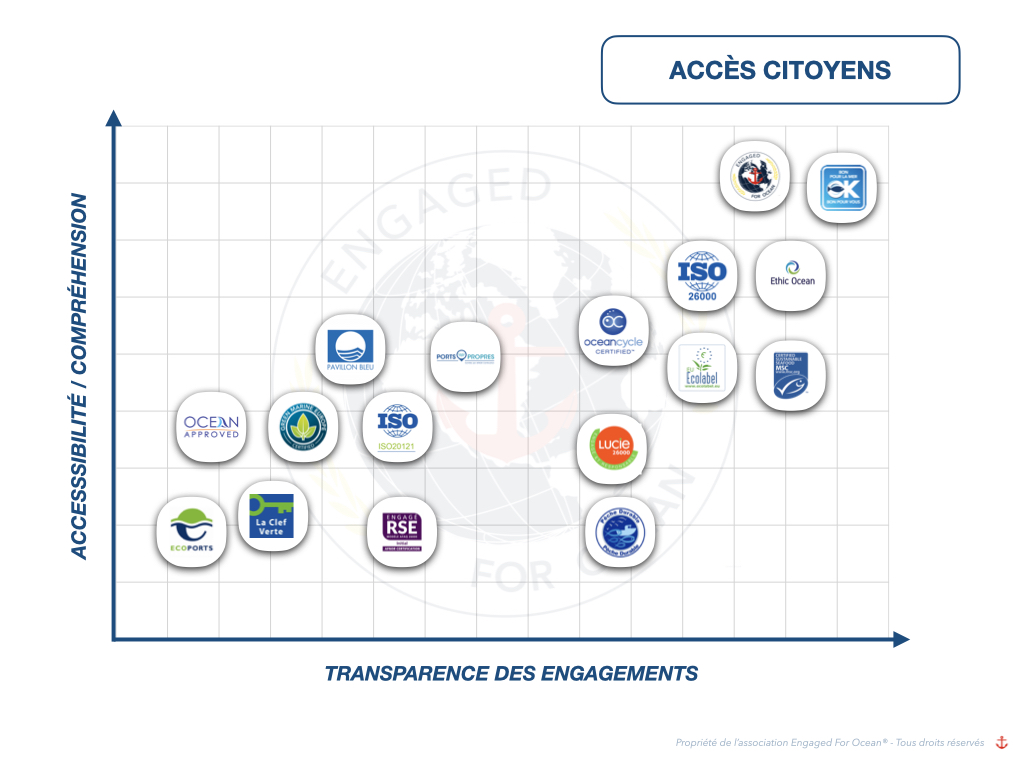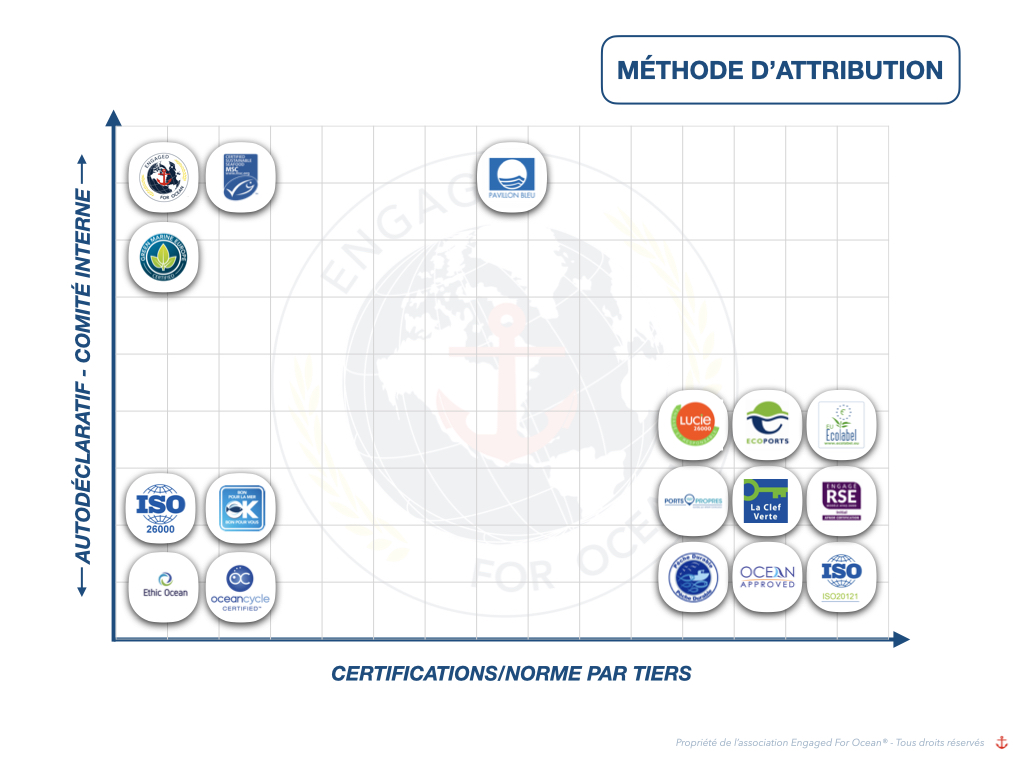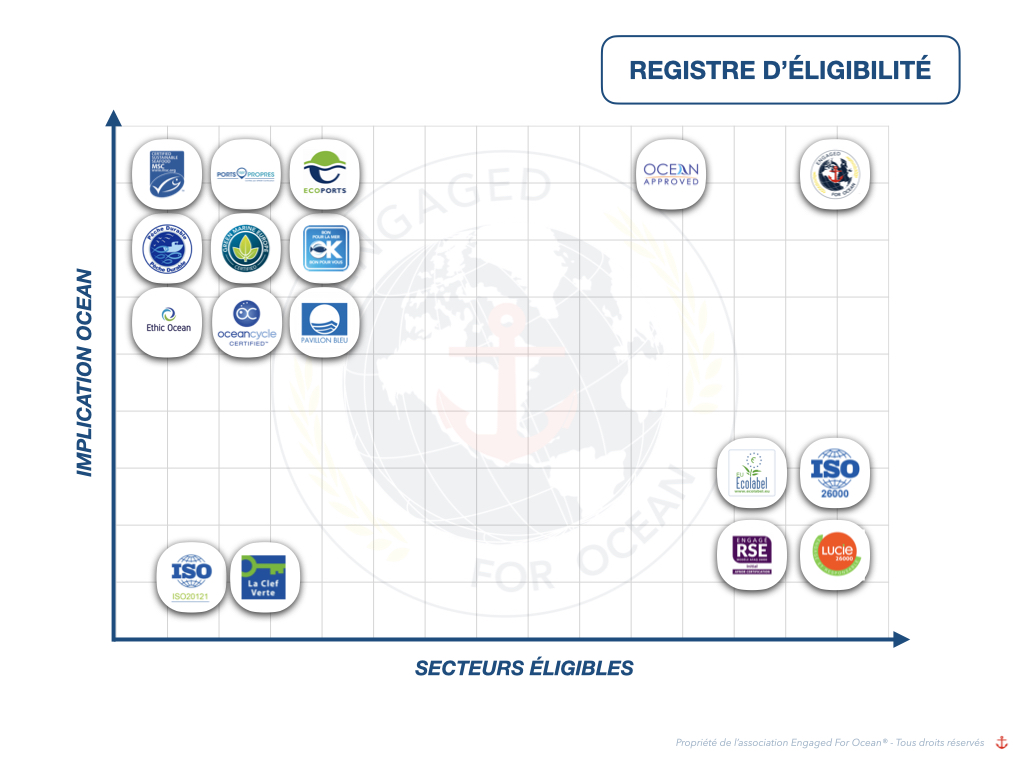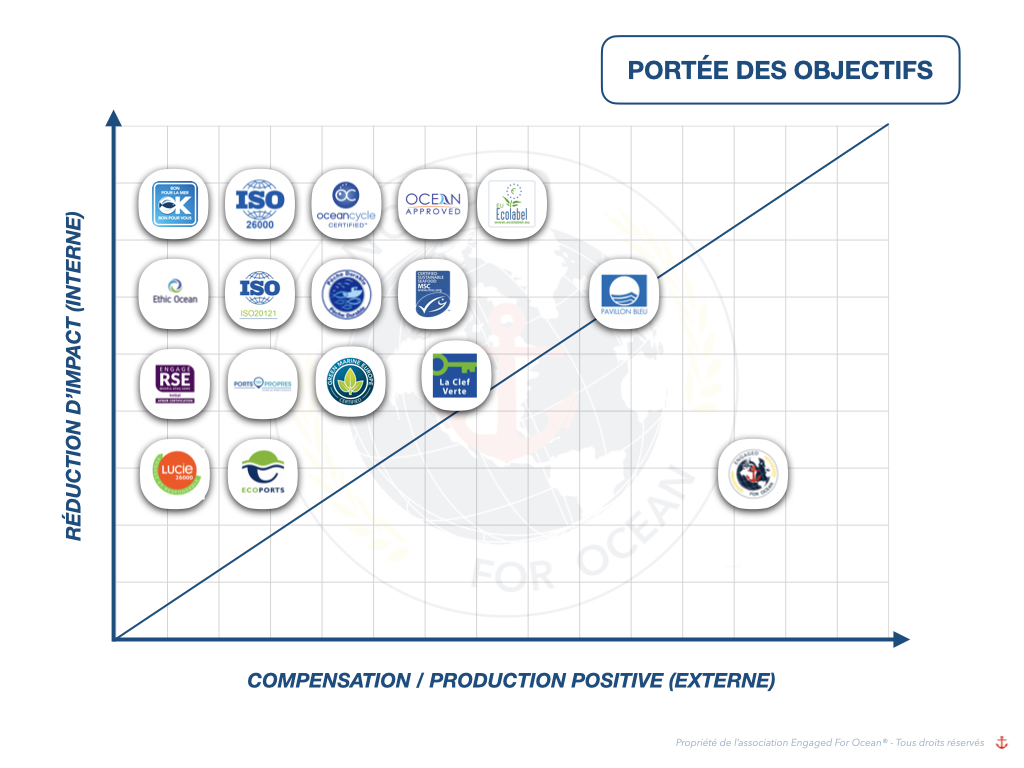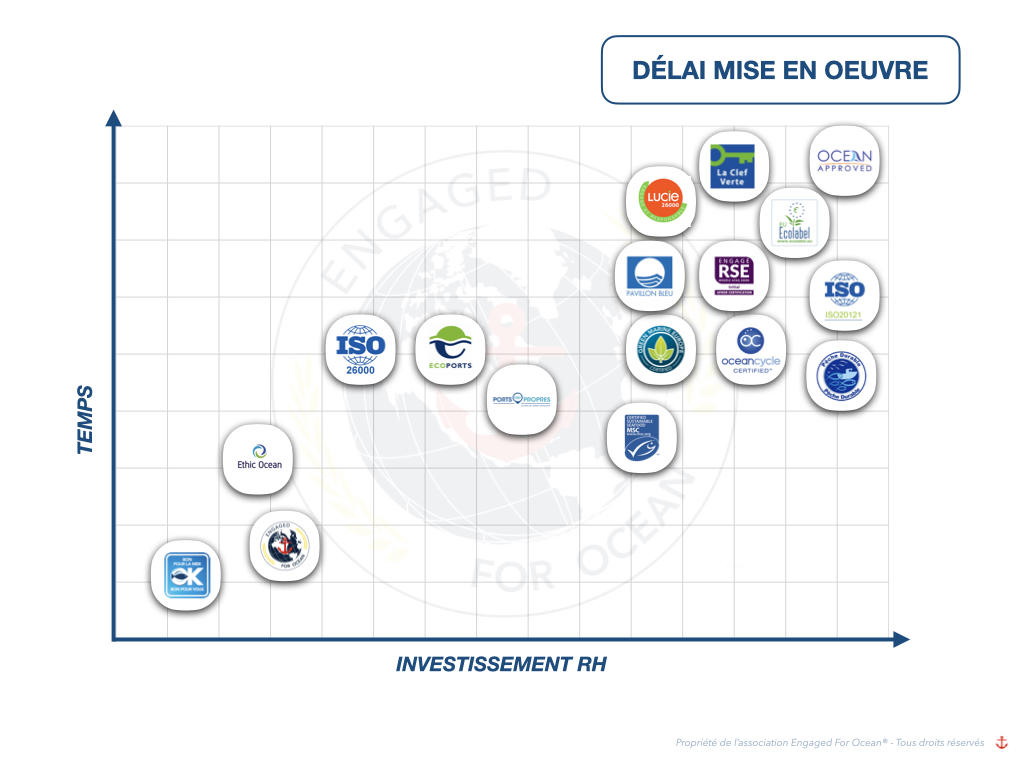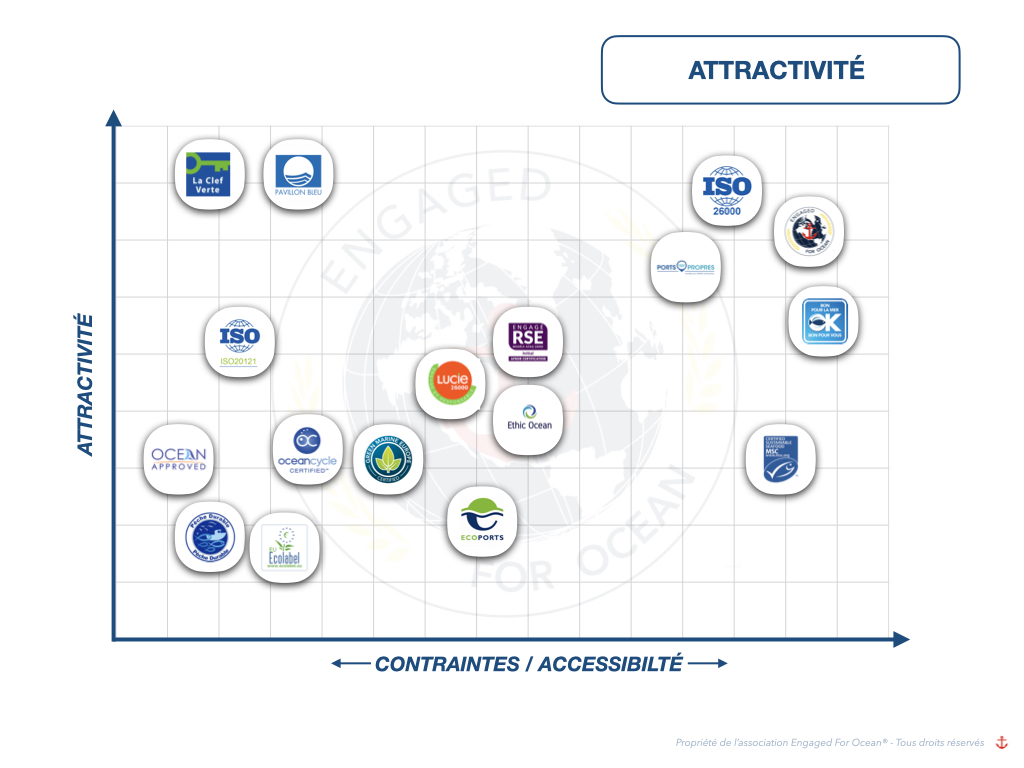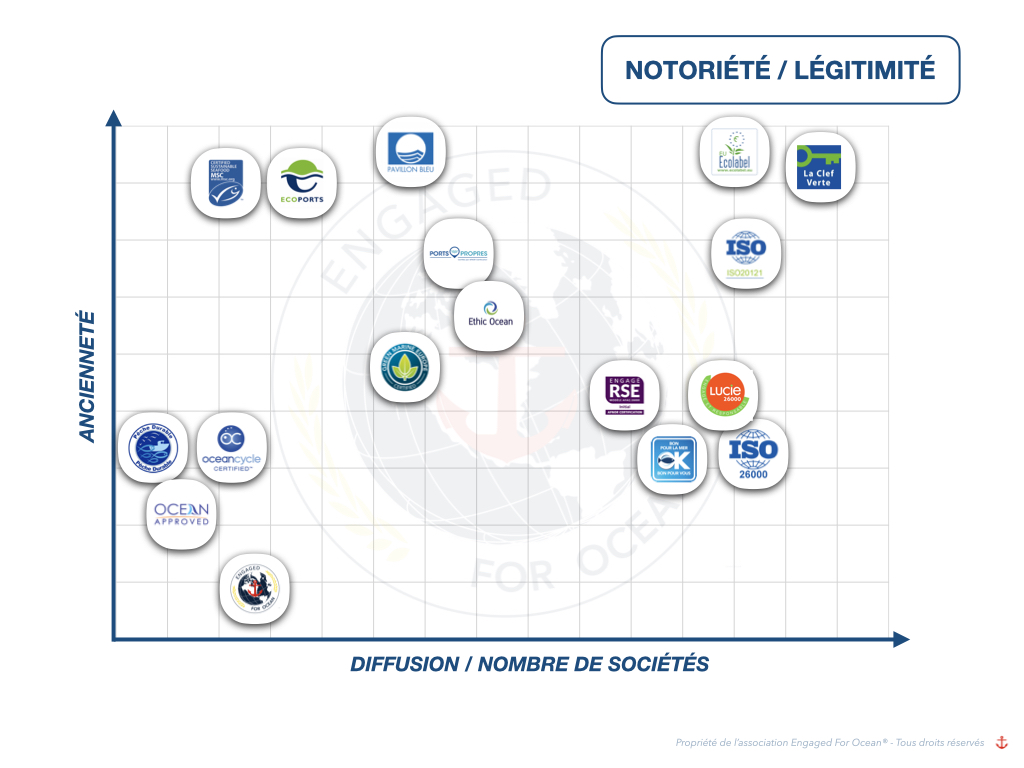Les labels, normes et certifications déjà existants, très qualitatifs, reposent sur une approche de limitation structurelle de l'impact des entreprises en optimisant les organes productifs et en accompagnant un approvisionnement raisonné et durable. Ce fonctionnement particulièrement efficace et incitatif permet de nombreuses avancées et évolution au sein des entreprises, chacun d'entre eux ayant ses propres spécificités et enjeux, qu'ils soient sectoriels, techniques ou commerciaux.
Engaged For Ocean, en complément des efforts de limitation d'impact, permet une externalisation de moyens de compensation générateur de résultats vertueux et mesurés.
Plus que complémentaire, Engaged For Ocean a un effet ampliatif des effets mesurables pour l'environnement et l'Océan des actions et menées par les entreprises déjà certifiées ou labellisées par ailleurs.
BENCHMARK
LABELS/CERTIFICATIONS/NORMES OCEAN
(cliquez pour agrandir)
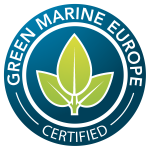
Née d’une initiative collective de l’industrie, Green Marine Europe a pour objectif de guider l’industrie maritime vers l’excellence environnementale en encourageant les entreprises maritimes à adopter des actions concrètes et mesurables, allant au-delà des exigences réglementaires. Le programme traite ainsi d’enjeux spécifiques au transport maritime, liés à la qualité de l’air, de l’eau et des sols. Il s’agit d’une initiative inclusive, rigoureuse et transparente qui regroupe plusieurs types d'armateurs et des chantiers maritimes. Pour obtenir la certification Green Marine Europe, les participants doivent remplir toutes les exigences du processus de certification. Le membership de Green Marine Europe regroupe aussi des associations, des supporteurs et des partenaires, qui, chacun à leur façon, appuient les participants dans leur démarche de réduction de leur empreinte environnementale.

L’Ecolabel Européen est le label officiel de la Commission européenne qui permet de distinguer les hébergements touristiques respectueux de l’environnement. En France, la certification est délivrée par AFNOR Certification. Les critères du référentiel « Hébergements touristiques » garantissent une réduction de l’impact environnemental sur l’ensemble de la structure touristique : la lingerie, le nettoyage des locaux, la restauration, la maintenance, le spa et la piscine, les espaces verts…

Les entreprises représentent un levier majeur pour réduire les impacts de l’activité humaine sur l’Océan.Depuis son origine la Fondation de la Mer est engagée auprès des entreprises et porte leur voix sur tous les sujets concernant l’Océan et l’eau. Elle les accompagne dans leurs démarches pour identifier leurs impacts, les évaluer, mettre en place leurs plans d’actions et valoriser les efforts de celles qui se transforment.
Pour cela, la Fondation de la Mer a développé le Référentiel Océan et le label OCEAN APPROVED®. Ces deux outils permettent aux entreprises de piloter simplement et efficacement ces transformations. Construits à partir de l’ODD14 et de l’ODD6, ils sont conformes aux normes établies et ont été créés en partenariat avec le BCG et Bureau Veritas.
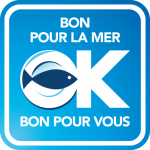
Mr.Goodfish est un programme européen qui a pour but de sensibiliser le public et les professionnels à la consommation durable des produits de la mer. Il a été initié par trois aquariums (Acquario di Genova en Italie, Aquarium Finisterrae en Espagne et Nausicaá – Centre National de la Mer, en France) parmi les plus importants d’Europe.
Les critères de sélection Mr.Goodfish ont été établis en France en partenariat avec IFREMER. Ils sont rigoureusement scientifiques et au nombre de 4 :
Etat de la ressource / Taille / Saison / Statut de l'espèce
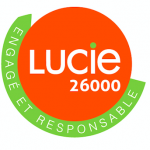
LUCIE est une communauté d’organisations qui partagent la même volonté : rendre ce monde plus juste et plus respectueux des hommes et du territoire.
Les attentes des citoyens évoluent, l'entreprise ne peut plus être un simple acteur économique. Elle doit créer du sens, avoir des valeurs et remplir sa mission en adoptant un modèle économique positif pour les hommes et son territoire.Vous partagez cette conviction et comme nous tous, vous souhaitez contribuer à relever les défis de demain.
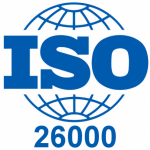
La norme ISO 26000 est une norme de l'Organisation internationale de normalisation (ISO) établissant les lignes directrices relatives à la responsabilité sociétale des entreprises1 et plus généralement des organisations, c'est-à-dire qu'elle définit comment les organisations peuvent et doivent contribuer au développement durable. Elle est publiée depuis le 1er novembre 20102.
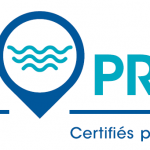
L’activité plaisance a une influence non négligeable sur le milieu et sur la qualité des eaux, tant dans les ports qu’aux alentours.
Les ports maritimes, de pêche et de plaisance générèrent des déchets toxiques (piles, batteries, huiles de vidange, solvants acides, matière plastique, résine, pots de peinture usagés, etc.) et des pollutions qui proviennent d’effluents (eaux de carénage, eaux usées, eaux pluviales) se déversant directement dans le port. Ainsi, en 2001 fut créée la démarche Ports Propres en Provence Alpes Côte d’Azur avec une convention de partenariat entre le Syndicat Mixte d’Aménagement Touristique du Languedoc-Roussillon et le Conseil Régional Provence Alpes Côte d’Azur.

OceanCycle fournit une certification tierce 100 % indépendante des chaînes d'approvisionnement de recyclage des plastiques en mer afin de garantir qu'elles répondent aux normes internationales de qualité, d'éthique, d'environnement et de travail.Notre certification utilise un système de chaîne de traçabilité unique en son genre. Les acheteurs de matériaux certifiés OceanCycle bénéficient d'une traçabilité de bout en bout de ces matériaux, depuis la collecte des bouteilles jusqu'à la fabrication.
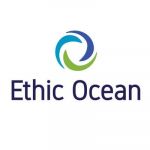
Ethic Ocean est une organisation environnementale dédiée à la préservation des ressources halieutiques et des écosystèmes marins. Sa mission est de créer des opportunités de changements et de contribuer à la mise en oeuvre de pratiques durables au sein de la filière.Notre vision : toutes les parties prenantes, usagers des océans, sont responsables et collaborent dans le but de trouver des solutions qui permettent d’utiliser les océans et leurs ressources de manière responsable, avec un moindre impact sur les océans, les écosystèmes et les communautés qui en dépendent.Notre mission : Ethic Ocean mobilise les professionnels en encourageant les bonnes pratiques en faveur de la préservation des océans et de leurs ressources.
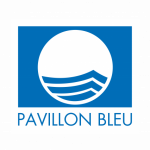
Créé par Teragir en 1985, le Pavillon Bleu valorise chaque année les communes et les ports de plaisance qui mènent de façon permanente une politique de développement touristique durable.Aujourd'hui présent dans 46 pays sur tous les continents, le Pavillon Bleu est devenu une référence dans les domaines du tourisme, de l'environnement et du développement durable.
Garant d'une bonne qualité environnementale, le Pavillon Bleu hissé sur une commune ou un port de plaisance, véhicule une image positive dynamique auprès des résidents comme des visiteurs. En ce sens, il favorise aussi une prise de conscience générale envers un comportement plus respectueux de la nature et de ses richesses.
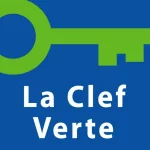
Passer au vert et mettre en œuvre la durabilité de bas en haut dans votre établissement n’est pas une tâche facile. Green Key reconnaît qu'aucun établissement n'est semblable à un autre et que différentes entreprises sont confrontées à des difficultés différentes en matière de durabilité. Par conséquent, notre programme offre un accompagnement tout au long du processus, du processus de candidature à la certification finale. Créée en 1994, Green Key possède déjà plus de 30 ans d'expérience dans le domaine de l'écolabellisation touristique, avec une base de connaissances étendue partagée avec les candidats et les établissements certifiés.
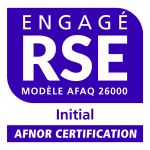
Le Label Engagé RSE est le label de référence aujourd’hui pour évaluer la maturité des démarches RSE des organisations sur la base de l’ISO 26000. Le label Engagé RSE s’adresse à tous les types d’organisations (entreprises, associations ou territoire) et quel que soit la maturité en RSE, la taille de l’entité ou le secteur d’activité.
Être labellisé Engagé RSE c’est adresser un signal fort : celui d’une organisation qui assume les impacts de ses décisions et s’engage pour un développement durable de ses activités. AFNOR Certification est ainsi fière de réunir une communauté de plus de 220 organisations labellisées en France et à l’international et plus de 600 organisations engagées dans le parcours de solutions « Engagé RSE »
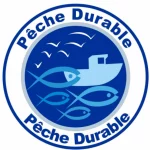
Depuis 2017, l'écolabel « Pêche Durable » est un signe de qualité qui valorise la pêche durable. Il certifie aux consommateurs que ces produits de pêche répondent à des exigences environnementales, économiques et sociales.
Cet écolabel public en France fait suite à la volonté de la filière pêche, en 2007, de créer un écolabel facilement reconnaissable par les consommateurs. Deux pêcheries de thon rouge de l'Atlantique (Sathoan, située à Sète, et l’organisation de producteurs de Vendée, située aux Sables-d’Olonne) ainsi qu'une halle à marée et sept entreprises de mareyage commercialisant leur production sont certifiées écolabel « Pêche Durable ».
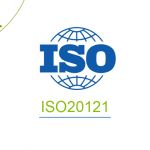
Pour inscrire votre événement, quel que soit son type ou sa taille, dans une logique de développement durable, utilisez ISO 20121.
Les activités événementielles prélèvent un lourd tribut sur les ressources, la société en général et l’environnement, en raison des déchets importants qu’elles peuvent souvent produire. Cette Norme internationale a été élaborée pour promouvoir une consommation responsable et atténuer les effets négatifs sur les infrastructures et les services publics locaux, ceci réduisant les risques de conflit au sein des collectivités qui accueillent les événements.

ECOPORT, Ecoports (ou EcoPorts) est un label accordé à des ports européens adhérant volontairement à de « bonnes pratiques » en matière de développement durable, dans le cadre d'un projet datant de 1999, soutenu par l'« EcoPorts Foundation » (EPF) qui est un réseau associant des acteurs volontaires qui sont « parties prenantes » de la gestion portuaire, et voulant partager leurs expériences en matière d'environnement. À ne pas confondre avec le label français de « port exemplaire », délivré par le ministère de l'environnement.
![SUSTAINABLE SEA FOODMSC[1]](https://engagedforocean.org/wp-content/uploads/2025/01/SUSTAINABLE-SEA-FOODMSC1-160x190.webp)
Le label MSC garantit que votre poisson a été pêché d'une manière responsable, en laissant suffisamment de poisson dans l'océan, en respectant l'environnement marin et en permettant aux pêcheurs de continuer à exercer leur métier.
On compte 11 pêcheries françaises certifiées dans le programme MSC, ce qui représente 12 espèces différentes et 19% des captures totales de poisson de navires de pêche français.



